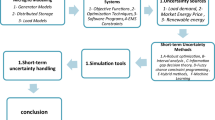Abstract
Economic-based approaches have been found to be effective for distributed resource management in Grid computing. However, deciding which model to use is challenging, because (1) the performance stability of a particular model in a dynamic and distributed environment, is hard to establish (2) the performance objective of the Grid network may be complex, and it is difficult to know which model would best fit such an objective, (3) evidence indicates that no single model can cope with every scenario, and (4) no suitable tools exist to accurately predict and contrast the performances of one model with another model in a particular domain. Understanding the strengths and weaknesses of widely proposed economic models in terms of a range of scenarios is, therefore, crucial. To address this, the authors developed a general evaluation platform suitable for analyzing the performance of different economic models in the Grid. This work identifies domains of strength of individual models and highlights their use in various scenarios of Grid computing.
Similar content being viewed by others
References
Buyya, R., et al.: Economic models for resource management and scheduling in Grid computing. Concurr. Comput. Pract. Experience 14(13–15), 1507–1542 (2002)
Mills, K.L., Dabrowski, C.: Can economics-based resource allocation prove effective in a computation marketplace. J. Grid Comput. 6, 291–311 (2008)
Beck, R., Schwind, M., Hinz, O.: Grid economics in departmentalized enterprises. J. Grid Comput. 6, 277–290 (2008)
Buyya, R., Abramson, D., Venugopal, S.: The Grid economy. Proc. IEEE 93(3), 698–714 (2005)
Bossenbroek, A., Tirado-Ramos, A., Sloot, P.M.A.: Grid resource allocation by means of option contracts. Syst. J. IEEE 3(1), 49–64 (2009)
Haque, A., Alhashmi, S.M., Parthiban, R.: A survey of economic models in Grid computing. Futur. Gener. Comput. Syst. 27(8), 1056–1069 (2011)
Haque, A., Alhashmi, S., Parthiban, R.: An inspiration for solving Grid resource management problems using multiple economic models. In: Vanmechelen, K., Altmann, J., Rana, O. (eds.) Economics of Grids, Clouds, Systems, and Services, pp. 1–16. Springer, Heidelberg (2012)
Stuer, G., Vanmechelen, K., Broeckhove, J.: A commodity market algorithm for pricing substitutable Grid resources. Futur. Gener. Comput. Syst. 23(5), 688–701 (2007)
Wolski, R., et al.: G-commerce: market formulations controlling resource allocation on the computational Grid. In: Proceedings 15th International Parallel and Distributed Processing Symposium (2001)
Tan, Z., Gurd, J.R.: Market-based Grid resource allocation using a stable continuous double auction. In: 8th IEEE/ACM International Conference on Grid Computing (2007)
Assuncao, M., et al.: Enabling the simulation of service-oriented computing and provisioning policies for autonomic utility grids. In: Proceedings of the 4th International Workshop on Grid Economics and Business (GECON’07). Rennes (2007)
Parkes, D.C., Ungar, L.H.: Iterative combinatorial auctions: theory and practice (2000)
Xing, L., Lan, Z.: A method based on iterative combinatorial auction mechanism for resource allocation in grid multi-agent systems. In: International Conference on Intelligent Human-Machine Systems and Cybernetics. IHMSC ’09 (2009)
Assuncao, M., Buyya, R.: An evaluation of communication demand of auction protocols in Grid environments. In: Proceedings of the 3rd International Workshop on Grid Economics and Business (GECON 2006). World Scientific Press (2006)
Caramia, M., Giordani, S.: Resource allocation in Grid computing: an economic model. J. WSEAS Trans. Comp. 3(1), 19–27 (2008)
Buyya, R., Murshed, M.: GridSim: a toolkit for the modeling and simulation of distributed resource management and scheduling for Grid computing. Concurr. Comput. Pract. Experience 14(13–15), 1175–1220 (2002)
Cirne, W., et al.: Grid computing for bag of tasks applications. In: Proceedings of the 3rd IFIP Conference on E-Commerce, E-Business and E-Government. Brazil (2003)
Buyya, R.: Economic-based distributed resource management and scheduling for Grid computing. Monash University, Melbourne (2002)
Buyya, R.: GridSim Documentation. Available from: http://www.buyya.com/gridsim/doc/faq.txt. 15 Aug 2012 (2012)
Broberg, J., Venugopal, S., Buyya, R.: Market-oriented Grids and utility computing: the state-of-the-art and future directions. J. Grid Comput. 6(3), 255–276 (2008)
Author information
Authors and Affiliations
Corresponding author
Rights and permissions
About this article
Cite this article
Haque, A., Alhashmi, S.M. & Parthiban, R. Identifying and Modeling the Strengths and Weaknesses of Major Economic Models in Grid Resource Management. J Grid Computing 12, 285–302 (2014). https://doi.org/10.1007/s10723-013-9289-9
Received:
Accepted:
Published:
Issue Date:
DOI: https://doi.org/10.1007/s10723-013-9289-9




